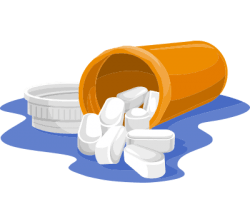 Providing safe treatment for pregnant women with opioid addiction is a top priority for substance abuse professionals. Opioid drugs like heroin, morphine, oxycodone, or codeine, which are chemically derived from compounds in the opium poppy, can cause addiction in the unborn baby as the intoxicants in the mother’s bloodstream are transmitted to the fetus. In adults, opioid withdrawal is usually not life-threatening, although the side effects can be extremely unpleasant. However, sudden withdrawal from opiates can cause fetal death in unborn infants and severe distress in newborns.
Providing safe treatment for pregnant women with opioid addiction is a top priority for substance abuse professionals. Opioid drugs like heroin, morphine, oxycodone, or codeine, which are chemically derived from compounds in the opium poppy, can cause addiction in the unborn baby as the intoxicants in the mother’s bloodstream are transmitted to the fetus. In adults, opioid withdrawal is usually not life-threatening, although the side effects can be extremely unpleasant. However, sudden withdrawal from opiates can cause fetal death in unborn infants and severe distress in newborns.
According to the American Congress of Obstetricians and Gynecologists, heroin abuse can cause severe complications with pregnancy, including:
- Restricted fetal growth
- Separation of the placenta from the uterine wall before delivery
- Premature labor
- Low birth weight
- Death of the fetus
In addition to these complications, intravenous heroin abuse poses the threat of blood-borne diseases like hepatitis and HIV/AIDS, as well as the social problems associated with drug abuse, such as unsafe sex, exposure to violence, and an increased risk of assault.
The drugs used to treat opioid addiction, including methadone and more recently buprenorphine (Suboxone), also pose a potential risk of birth defects. But these risks may be minor compared to the potential harm that can be done by heroin abuse or the misuse of prescription pain medications.
What Is Suboxone?
 The 2013 National Survey on Drug Use and Health shows that 5.4 percent of pregnant teenage girls and adult women used illicit drugs like heroin that year, as compared to 11.4 percent of women who were not pregnant. For women who are addicted to opiate drugs, a medication like Suboxone can help relieve the cravings for illicit opiates and ease the uncomfortable symptoms of withdrawal, making it easier to stay off drugs and have a healthy pregnancy and delivery.
The 2013 National Survey on Drug Use and Health shows that 5.4 percent of pregnant teenage girls and adult women used illicit drugs like heroin that year, as compared to 11.4 percent of women who were not pregnant. For women who are addicted to opiate drugs, a medication like Suboxone can help relieve the cravings for illicit opiates and ease the uncomfortable symptoms of withdrawal, making it easier to stay off drugs and have a healthy pregnancy and delivery.
Suboxone is a prescription medication that combines two drugs: buprenorphine and naloxone. Buprenorphine is an opiate drug that allows people who are addicted to opiates to withdraw gradually while maintaining a relatively normal life. Naloxone is an anti-opioid medication that reverses the effects of narcotics in the event of an opioid overdose. The addition of naloxone to buprenorphine is intended to reduce the risk of overdose or death if the user takes too much of the medication.
Buprenorphine was first approved for opioid addiction treatment by the U.S. Food and Drug Administration in 2002. Since that time, medications containing buprenorphine, like Suboxone and Subutex, have become increasingly popular as an alternative to methadone, a drug that has been prescribed for the treatment of heroin addiction since the 1960s. The Substance Abuse and Mental Health Services Administration states that the euphoric effects and addictive properties of buprenorphine are milder than the effects of methadone, reducing the potential for abuse and addiction.
Suboxone is taken as a small piece of film that dissolves under the tongue. This sublingual form makes the drug more difficult to abuse than oral tablets, which can be crushed into a powder and snorted or diluted for intravenous injection.
What Are the Risks of Suboxone During Pregnancy?
Suboxone is classified by the U.S. Food and Drug Administration (FDA) as a Pregnancy Category C drug, meaning that the medication may pose some risks of complications during pregnancy or birth defects. As an opioid drug, buprenorphine may cause a certain level of opioid addiction and withdrawal in newborns. However, the FDA adds that clinical data on major birth defects and complications is limited. For most women, the risks of abusing heroin or prescription opiates far outweigh the limited risks of taking Suboxone under a doctor’s supervision as part of a treatment program for opiate addiction.
What Are the Alternatives to Suboxone?
 Methadone maintenance therapy has been the gold standard of opioid treatment in pregnant women since the 1970s. Pregnant women who are addicted to opioids can take methadone to avoid withdrawals, maintain abstinence from heroin, and increase their chances of having a healthy, uncomplicated pregnancy and birth. Like buprenorphine/Suboxone, methadone is a Category C drug, which indicates that there have not been sufficient studies of methadone use in pregnant women to fully determine the risks. However, experience with the drug has shown that methadone maintenance therapy has helped many women overcome opioid addiction during pregnancy and carry their babies successfully to term.
Methadone maintenance therapy has been the gold standard of opioid treatment in pregnant women since the 1970s. Pregnant women who are addicted to opioids can take methadone to avoid withdrawals, maintain abstinence from heroin, and increase their chances of having a healthy, uncomplicated pregnancy and birth. Like buprenorphine/Suboxone, methadone is a Category C drug, which indicates that there have not been sufficient studies of methadone use in pregnant women to fully determine the risks. However, experience with the drug has shown that methadone maintenance therapy has helped many women overcome opioid addiction during pregnancy and carry their babies successfully to term.
The results of the MOTHER study indicate that withdrawal symptoms were less severe in babies born to mothers taking Suboxone than in women taking methadone. There are also other advantages to taking Suboxone:
- Suboxone has a lower potential for abuse and addiction than methadone, according to the Substance Abuse and Mental Health Services Administration.
- The risks of respiratory depression and opiate overdose are lower with Suboxone than with methadone, making it safer for most users.
- The overall side effects of Suboxone are generally considered to be less severe than methadone.
- Methadone can be obtained only through federally regulated facilities that are qualified to dispense this medication, while Suboxone can be prescribed by any physician who has been certified in its use, making it more convenient to take the drug.
Suboxone may be more appropriate for women with a history of light to moderate opiate abuse, while methadone may be more effective for women who are heavy, chronic users, notes the Journal of Neurosciences in Rural Practice. Pregnant women who considering opioid replacement therapy should have a thorough medical assessment that covers their substance abuse history, physical and psychological health, and psychosocial considerations.
How Can I Get Help for Opioid Addiction?
For opiate-addicted pregnant women and their babies, opioid replacement therapy can literally be a lifesaver. But medication alone can’t resolve the psychosocial problems caused by substance abuse or ensure a full recovery from opiate addiction. Along with Suboxone therapy, pregnant women can benefit from comprehensive treatment programs that include services such as:
- Individual psychotherapy
- Self-help support groups
- Cognitive behavioral therapy (CBT)
- Family or couples counseling
- Prenatal and parenting classes
- Nutritional counseling
Axis provides intensive rehab programs that are tailored to the client’s individual needs. The structure and support of round-the-clock care create an environment where true healing can take place. In addition to our long-term residential treatment options, we offer partial and intensive outpatient treatment (IOP), opioid detoxification programs, and sober living facilities for clients who are making the transition back to the community. We also provide holistic add-on services such as acupuncture, massage, and hypnotherapy. Call our toll-free number at any time to learn more about our evidence-based, individualized approach to recovery.


